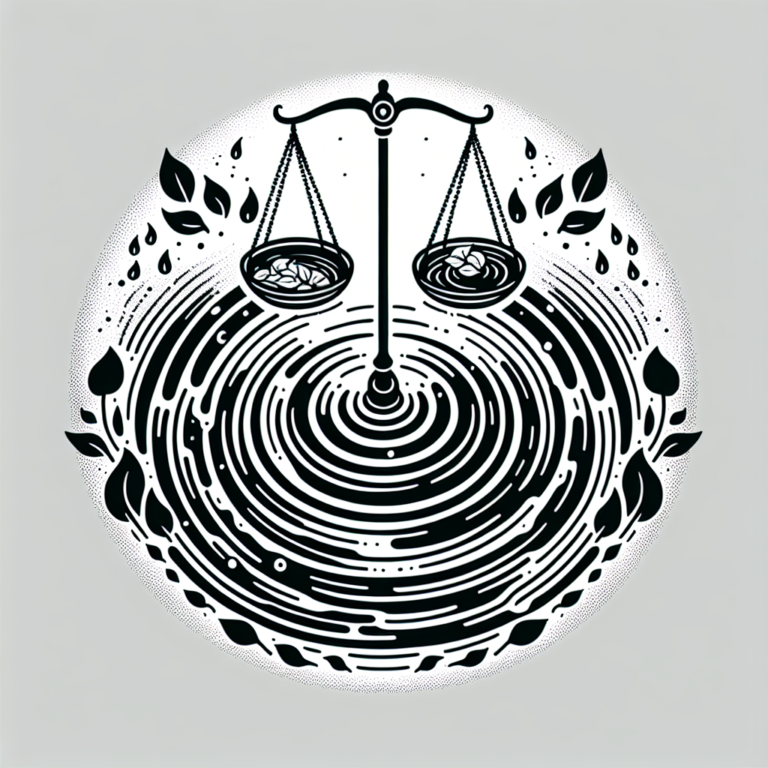The Law of Karma, originating from ancient Indian philosophies and religions, has intrigued humans for thousands of years. At its essence, the Law of Karma suggests that every action has consequences. This principle serves not only as a moral compass but also as a governing law of the universe that underscores the interconnected nature of our actions and their outcomes.
1. Historical Context
Karma derives from the Sanskrit word “karman,” meaning “action” or “deed.” The concept is deeply rooted in Hinduism, Buddhism, Jainism, and Sikhism, each presenting its unique interpretation yet sharing a common foundation: the idea that the actions of an individual influence their future.
1.1 Karma in Hinduism
Within Hinduism, karma is often tied to the cycle of samsara (the cycle of birth, death, and rebirth). Adherents believe that good deeds (punya) lead to favorable outcomes in future lives, while bad actions (papa) result in suffering. This belief encourages adherents to live ethical lives, improve their karma, and seek liberation (moksha) from the cycle of samsara.
1.2 Karma in Buddhism
Buddhism interprets karma slightly differently, emphasizing intention. It teaches that not only the action but the intent behind the action influences karmic results. Skillful actions lead to positive karma, while unskillful actions yield negative karma. In Buddhism, understanding karma helps individuals cultivate compassion and mindfulness.
1.3 Jainism and Sikhism Perspectives
Jainism also emphasizes the importance of karma while noting its material form, affecting the soul’s spiritual purity. Sikhs view karma as one of the laws of existence but ultimately stress the grace of God as a determinant of fate.
2. The Principle of Cause and Effect
The foundation of the law of karma is underpinned by the fundamental principle of cause and effect. Each action generates a reaction that resonates within the framework of the universe. This principle manifests on various levels – personal, social, and ecological.
2.1 Personal Karma
On a personal level, karma encourages a reflective approach towards one’s behavior. Individuals are prompted to consider how their choices—be it kindness, deceit, honesty, or aggression—can shape their personal experiences and relationships. For example, a single act of kindness can create a ripple effect, inspiring more positivity in others, while deceit may create a cycle of distrust.
2.2 Social Karma
Socially, karma influences collective outcomes. Societies that prioritize compassion, equity, and justice tend to experience greater harmony, while those rife with injustice and negativity may suffer adverse effects. Understanding social karma can help nations and communities foster policies that promote kindness and accountability.
2.3 Ecological Karma
Ecological issues also illustrate karma. The actions of humanity towards the environment will inevitably lead to corresponding effects—both positive and negative. Unsustainable practices may ultimately result in ecological degradation, while sustainable behaviors help restore balance. Recognizing this interconnectedness is essential for cultivating our relationship with the planet.
3. Karma and Justice
The interplay of karma and justice presents a unique lens through which to view fairness and accountability. Karma purports an ethical framework that transcends temporal justice systems, suggesting that justice is not merely an immediate consequence but can unfold over time.
3.1 Temporal vs. Cosmic Justice
Human legal systems often struggle with timely justice, where the outcome of actions may not manifest until later, if at all. In contrast, karma operates on a cosmic level, asserting that all deeds will eventually be accounted for, although not necessarily within the confines of an individual’s lifetime. This notion provides comfort to those who have suffered injustice, reinforcing the belief that the universe balances itself.
3.2 Personal Accountability
The law of karma fosters an understanding of personal accountability. Individuals are encouraged to take responsibility for their actions, as even minor decisions have the potential to influence wider circumstances. This perspective fosters a deeper sense of reflection, urging individuals to lead lives that align with their moral ideals.
4. Misinterpretations of Karma
Despite its profound philosophical roots, the law of karma is often misconceived in modern discourse.
4.1 Karma as Fatalism
One common misinterpretation is equating karma with fatalism—a belief that individuals are doomed by their past actions without hope for change. In reality, karma promotes growth and transformation. While past actions influence the present, individuals possess the agency and power to create positive change moving forward.
4.2 Oversimplification of Consequences
Another misunderstanding arises from the oversimplification of karma, where people assume immediate payback for actions. This misconception disregards the complexity of karma, which unfolds over time and can manifest in various ways. Some may experience the consequences of their actions sooner than others, but every action is a step along an intricate path—a path that can be reshaped by subsequent choices.
5. Practical Applications of Karma
Understanding and applying the law of karma can profoundly impact individual lives and society as a whole.
5.1 Cultivating Mindfulness
Mindfulness practices can help individuals become more aware of their thoughts, actions, and intentions. By observing oneself without judgment, individuals can better understand the ramifications of their decisions, fostering a sense of responsibility and a desire to act mindfully.
5.2 Encouraging Positive Actions
The recognition of karma can inspire individuals to engage in positive actions, be it through acts of kindness, community service, or environmental stewardship. Acknowledge how each action affects not just oneself, but the greater web of existence. Collective actions working towards good can create a positive feedback loop, enhancing community well-being.
5.3 Healing from Past Actions
Understanding karma opens pathways for healing. Individuals can learn to forgive themselves and others, acknowledging past mistakes while committing to making better choices in the future. By understanding that one’s current actions can amend past wrongs, individuals can reclaim their agency, paving the way for personal growth.
6. Case Studies: Karma in Action
Real-life examples and narratives can elucidate the complex nature of karma and its impact.
6.1 Personal Stories of Transformation
Consider the story of a person who once engaged in unethical business practices for personal gain. Over time, as they encountered the struggles brought on by their initial choices—lost relationships, scruples—the individual experienced a shift in perspective. Choosing to change their business ethics and support community projects, they reaped the benefits of new connections and respect, illustrating the transformational journey of karmic retribution.
6.2 Societal Examples
On a societal level, instances where communities implement sustainable initiatives ultimately lead to improved environmental and health outcomes demonstrate collective karma at work. A town that prioritizes green policies fosters a healthier environment, ultimately benefiting the broader population, revealing karma’s role in societal accountability and progress.
Conclusion
In conclusion, the law of karma serves as a vital principle revealing the interconnectedness of our actions, intentions, and their inevitable consequences. Beyond mere philosophical doctrine, karma encourages deep personal accountability, reflection, and growth. While our actions may not always yield immediate results, the underlying truth of cause and effect weaves its way through the fabric of our lives, shaping the experiences of individuals and societies alike.
By embracing the law of karma, individuals can cultivate mindfulness, promote ethical behavior, and contribute to the greater good. The notion that our choices reverberate across time and space instills a profound sense of purpose, nudging us towards more compassionate, responsible lives. In a world fraught with challenges, understanding karma can serve as a guiding light toward justice, connection, and ultimately, harmony.
FAQs
What is the meaning of karma?
Karma is a concept that refers to the principle of cause and effect, where every action has consequences, shaping an individual’s future experiences based on their past actions.
Can karma be changed?
Yes, while past actions influence the present, individuals have the power to change their future outcomes through conscious and positive actions.
Does karma apply to everyone?
Karma applies universally, affecting everyone regardless of their beliefs. Every action contributes to the collective karmic experience of the universe.
Is karma the same as fate?
No, karma is not the same as fate; while karma deals with the effects of free will, fate suggests predetermined outcomes. Karma emphasizes personal accountability and the ability to influence one’s path through decisions.
How can I improve my karma?
Improving your karma involves making mindful, positive choices, practicing compassion, engaging in community service, and reflecting on your actions. Seeking to create good in the world can lead to positive karmic outcomes.
https://open.ai/ed7cb125d8f23fae8299af312b3cdfcd , Of course! What kind of prompt are you looking for? It could be related to writing, art, a discussion topic, or something else entirely. Let me know your preferences!, #Law #Karma #Understanding #Justice #Effect, #Law #Karma #Understanding #Justice #Effect, 1734025779, the-law-of-karma-understanding-justice-through-cause-and-effect





